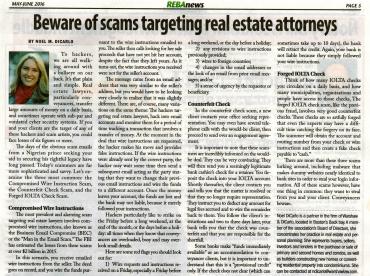Check out Attorney Di Carlo's latest article published in REBA news!
Beware of Scams Targeting Real Estate Attorneys
By: Noel M. DiCarlo
To hackers, we are all walking around with a bullseye on our back. It’s that plain and simple. Real estate lawyers, particularly conveyancers, transfer large amounts of money on a daily basis, and sometimes operate with sub-par and outdated cyber security systems. If you and your clients are the target of any of these hackers and scam artists, you could face losses of six figures, or more.
The days of the obvious scam emails from a foreign prince (usually from Nigeria!) seeking your aid in securing his rightful legacy have long passed. Today’s scammers are far more sophisticated and savvy. The three most common scams are: the Compromised Wire Instruction Scam, the Counterfeit Check Scam, and the Forged IOLTA Check Scam.
Compromised Wire Instructions
The most prevalent and alarming scam targeting real estate lawyers involves compromised wire instructions, also known as the Business Email Compromise (BEC) or the “Man in the Email Scam”. The FBI has estimated the losses from these scams at over $2 billion in 2015.
In this scenario, you receive emailed wire instructions from the seller. The deed goes on record, and you wire the funds pursuant to the wire instructions emailed to you. The seller then calls looking for her sale proceeds that have not yet hit her account, despite the fact that they left yours. As it turns out, the wire instructions you received were not for the sellers account. The message came from an email address that was very similar to the seller’s address, but you would have to be looking very closely to realize that it was slightly different. There are of course many variations of the same theme. Here, the hackers targeting real estate lawyers, hack into your email account and monitor your account for a period of time tracking a transaction that involves a transfer of money. At the moment in the deal that wire instructions are requested, the hacker makes his move and provides false instructions. If the wire instructions were already sent by the correct party, the hacker may wait some time then send a subsequent email acting as the party stating that they actually want to change their previous email instructions and wire the funds to a different account. Once the money leaves your account, the funds are lost and the bank may not liable because it merely followed your instructions.
Hackers particularly like to strike on the Friday before a long weekend, at the end of the month, or the days before a holiday – all times when they know that conveyancers are overloaded, busy and may overlook small details.
Here are some red flags you should look out for:
- Wire requests and instructions received on a Friday, especially a Friday before a long weekend, or the day before a holiday;
- Any revisions to wire instructions previously provided;
- Wires to foreign countries;
- Changes in the email addresses or the look of an email from prior email messages;
- A sense of urgency by the requestor or beneficiary.
Counterfeit Check Scam
In the counterfeit check scam, a new client contacts your office seeking representation. You may even have several telephone calls with the would-be client, and then proceed to send over an engagement agreement. It is important to note that these scammers are incredibly informed on the would-be deal. They can be very convincing. They will then send you a seemingly legitimate bank cashier’s check for a retainer. You deposit the check into your IOLTA account. Shortly thereafter, the client contacts you and tells you that the matter is resolved or that they no longer require representation. They instruct you to deduct any amount for legal fees accrued and to wire the remainder back to them. You follow the client’s instructions and two to three days later, your bank tells you that the check was counterfeit and that you are responsible for the shortfall. Some banks make “funds immediately available” as an accommodation to conveyancer clients, but it is important to understand that this is a “provisional credit” only. If the check does not clear (which can sometimes take up to even 10 days), the bank will retract the credit. Again, your bank is not liable because they followed your wire instructions.
Forged IOLTA Check Scam
Think of how many IOLTA checks you circulate on a daily basis and how many municipalities, organizations, and people have access to those checks. The forged IOLTA check scam, like the previous scam, involves very good counterfeit checks. These checks are so artfully forged, even the experts may have a difficult time catching the forgery on its face. The scammer will obtain the account and routing number from your check or wire instructions and then create a fake check payable to “cash”.
There are more than these three scams lurking around, such as malware that makes dummy websites nearly identical to bank sites in order to steal your log-in information. All these scams however, have one thing in common: they want to steal from you and your client. Conveyancers beware.
